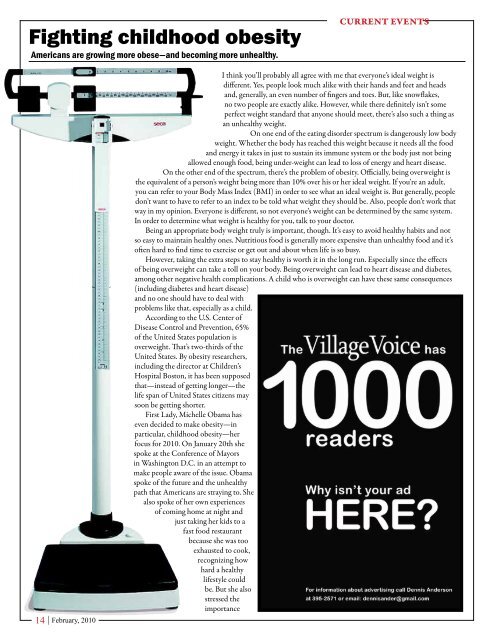February 2010 - Trout Lake School
February 2010 - Trout Lake School
February 2010 - Trout Lake School
- No tags were found...
Create successful ePaper yourself
Turn your PDF publications into a flip-book with our unique Google optimized e-Paper software.
Fighting childhood obesity<br />
Americans are growing more obese—and becoming more unhealthy.<br />
CURRENT EVENTS<br />
14 | <strong>February</strong>, <strong>2010</strong><br />
I think you’ll probably all agree with me that everyone’s ideal weight is<br />
different. Yes, people look much alike with their hands and feet and heads<br />
and, generally, an even number of fingers and toes. But, like snowflakes,<br />
no two people are exactly alike. However, while there definitely isn’t some<br />
perfect weight standard that anyone should meet, there’s also such a thing as<br />
an unhealthy weight.<br />
On one end of the eating disorder spectrum is dangerously low body<br />
weight. Whether the body has reached this weight because it needs all the food<br />
and energy it takes in just to sustain its immune system or the body just not being<br />
allowed enough food, being under-weight can lead to loss of energy and heart disease.<br />
On the other end of the spectrum, there’s the problem of obesity. Officially, being overweight is<br />
the equivalent of a person’s weight being more than 10% over his or her ideal weight. If you’re an adult,<br />
you can refer to your Body Mass Index (BMI) in order to see what an ideal weight is. But generally, people<br />
don’t want to have to refer to an index to be told what weight they should be. Also, people don’t work that<br />
way in my opinion. Everyone is different, so not everyone’s weight can be determined by the same system.<br />
In order to determine what weight is healthy for you, talk to your doctor.<br />
Being an appropriate body weight truly is important, though. It’s easy to avoid healthy habits and not<br />
so easy to maintain healthy ones. Nutritious food is generally more expensive than unhealthy food and it’s<br />
often hard to find time to exercise or get out and about when life is so busy.<br />
However, taking the extra steps to stay healthy is worth it in the long run. Especially since the effects<br />
of being overweight can take a toll on your body. Being overweight can lead to heart disease and diabetes,<br />
among other negative health complications. A child who is overweight can have these same consequences<br />
(including diabetes and heart disease)<br />
and no one should have to deal with<br />
problems like that, especially as a child.<br />
According to the U.S. Center of<br />
Disease Control and Prevention, 65%<br />
of the United States population is<br />
overweight. That’s two-thirds of the<br />
United States. By obesity researchers,<br />
including the director at Children’s<br />
Hospital Boston, it has been supposed<br />
that—instead of getting longer—the<br />
life span of United States citizens may<br />
soon be getting shorter.<br />
First Lady, Michelle Obama has<br />
even decided to make obesity—in<br />
particular, childhood obesity—her<br />
focus for <strong>2010</strong>. On January 20th she<br />
spoke at the Conference of Mayors<br />
in Washington D.C. in an attempt to<br />
make people aware of the issue. Obama<br />
spoke of the future and the unhealthy<br />
path that Americans are straying to. She<br />
also spoke of her own experiences<br />
of coming home at night and<br />
just taking her kids to a<br />
fast food restaurant<br />
because she was too<br />
exhausted to cook,<br />
recognizing how<br />
hard a healthy<br />
lifestyle could<br />
be. But she also<br />
stressed the<br />
importance






